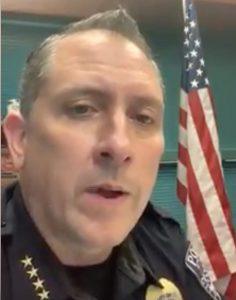Fort Smith Police Chief: ‘Silence is not working’ on racial issues
by May 28, 2020 9:22 pm 3,887 views

Fort Smith Police Chief Danny Baker took to Facebook Wednesday (May 27) in response to the killing of George Floyd by a Minneapolis police officer. Baker denounced recent acts of racial violence and reassured Fort Smith residents those types of events would not occur in the city.
Baker acknowledged that many are angry about the events, the killing of Floyd and the fatal shooting of Ahmaud Arbrey, a black man out for a run in his Georgia neighborhood, by two white men.
“I’m angry too,” Baker said in his video post. “I wish I knew why these things happen.”
He said he felt compelled to stand up and say something about the events because “silence is not working.” Baker said police officers are supposed to be the peacemakers, but what is going on today in this country is “anything but peacemaking. If anything, it’s creating a bigger divide in people.” He said he wants black neighbors and friends in Fort Smith to know the Fort Smith Police Department sees what is happening and is committed to making sure it does not happen in Fort Smith.
“I have long been a believer in community policing as a mindset, not a policy or a program, and our department has embraced this philosophy over the last few years, both on the streets and on social media,” Baker said.
He said his first priority once being named chief of police in Fort Smith was to change the culture that once existed in the department. A key component of that was to develop a vision statement that focused on improving the lives of everyone the police encountered instead of focusing merely on enforcement.

“It meant getting out into the community and building relationships with every segment of our community. It meant establishing as many meaningful non-enforcement contacts as we could and making community policing just as important to the job as the enforcement aspects,” Baker said.
Effective community policing also means having a department that reflects the demographics of the community, Baker said. The department actively recruits more diverse candidates, Baker said, noting it has found some success though there is still work needed to get the department to be a more accurate reflection of the city.
“I have a Chief’s Advisory Council that helps to guide me in this regard. They are a board of diverse individuals within the department who advise me regarding what’s going on in our community and department. They also help bring attention to exemplary actions that our officers are displaying that emphasize the community policing mindset,” Baker said.
He said FSPD strives to minimize the need for the use of force and to review each case that results in a use of force, making certain proper protocols were followed every step of the way. Those actions are reviewed and investigated at every level of supervision and management within the department, Baker said.
“I regularly emphasize to my command staff that any attempts to cover up, condone or overlook bad behavior will be handled as the serious matters that they are,” Baker said.
The department also uses body cameras for all uniformed officers and requires the use of the cameras in every citizen encounter for added transparency. This allows for easier review of officer actions with clarity, impartiality and accountability as the focus, Baker said, noting these videos are available to the public through the Arkansas Freedom of Information Act.
Under Baker’s tenure, policies have been changed that now require all deaths resulting from the use of force by an FSPD officer to be investigated by an external agency.
“Embracing the guardian mindset versus the warrior mindset in all of our officers has been one of the six pillars of 21st century policing we have and continue to focus heavily on. This change in mindset has been instrumental to the cultural change I spoke of,” Baker said.
The department also emphasizes training officers on de-escalation. More than half of the police department is certified in crisis intervention and de-escalation tactics.
“As an extension of that, I have instituted a Mental Health and Crisis Intervention Unit that went live on April 1. This has allowed the FSPD to follow up with individuals who may pose a threat to themselves and others, offering non-enforcement support for them and their family members to ensure they are getting the help that they need for possible mental health issues,” Baker said.
To address the “undeniable existence of implicit bias” in police work as every other profession, the FSPD will hold June 4-5 a diversion, equity and inclusion workshop with Hannibal Johnson, an attorney, author and consultant who specializes in diversity, inclusion, and cultural competence issues. Baker said the department has had the workshop planned since mid-April “because we are aware of the divisions in our society and mindful that Fort Smith is not immune to the problems that we’re seeing play out in Georgia and Minnesota.”
The workshop is mandatory to all FSPD personnel, sworn and non-sworn, and is open to other department heads and supervisors in the city. FSPD also requires updated training in racial profiling for all officers.
